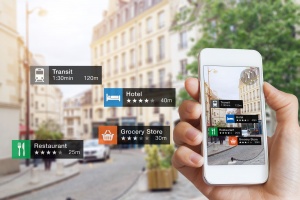The digital age has revolutionized the travel sector, making it more dynamic and accessible than ever.
Adtech solutions are at the vanguard of this transition, enabling advancements that improve both the travel experience and the marketing methods used by travel firms. As we move forward, various adtech solutions are positioned to transform the future of travel by creating new opportunities for engagement and revenue.
Personalized Advertising with Data Analytics
Consider arranging a trip and having advertisements for idyllic beach resorts, thrilling mountain climbs, and comfortable city getaways appear on your screen. Coincidence? Not at all. This is the magic of personalized advertising through data analytics, in which adtech solutions evaluate your online behavior to produce tailored adverts that appeal to your travel interests.
READ MORE: Amazon Advertising Earned $50 Billion Over The Past 12 Months, And It’s Only Getting Started
For example, data-driven adtech solutions can forecast a traveler’s future travel plans based on their previous searches, bookings, and social media interactions. This allows marketers to send targeted adverts that appeal to the traveler, improving the likelihood of engagement and conversion. Basis Technologies found that travel marketers are increasingly relying on first-party data to customize their advertising experiences.

Immersive experiences with AR and VR
Now, let us discuss about virtual reality. Imagine putting on a VR headset and walking through the beautiful grounds of a Balinese home or navigating Tokyo’s frenetic streets. AR and VR are changing the way we travel even before we pack our bags. These technologies offer immersive experiences that enable potential travelers to research locations, hotels, and attractions from the comfort of their own homes.
AR can improve the travel experience by adding interactive and informational overlays to real-world environments. Consider walking through a historical site using AR glasses that display extensive information about the history and significance of each landmark. This not only enhances the vacation experience, but also functions as an effective marketing tool for travel companies.
The Power of Mobile Advertising
With the growing reliance on mobile devices for travel planning and booking, mobile advertising has become an essential component of travel marketing campaigns. Mobile advertisements are extremely effective at reaching passengers at all stages of their journey, from original inspiration to final booking.

User adoption and engagement in travel apps have increased significantly. For example, eviivo Mobile, a travel app released in 2022, saw more than 82% of its users download the app within the first two months. Mobile apps offer a simple platform for travel firms to communicate with their audience via personalized notifications, exclusive offers, and live updates.
Leveraging 5G for Improved Connectivity
The introduction of 5G technology is expected to transform the travel sector by enabling quicker and more dependable connectivity. This improved connectivity will allow travel brands to provide high-quality, real-time content to their target audience. For example, 5G can offer high-resolution streaming of live events, virtual tours, and immersive experiences, making the travel experience richer and more engaging.
Furthermore, 5G will improve the utilization of Internet of Things (IoT) devices in the tourism industry. IoT sensors can collect information about traveler behavior and preferences, allowing travel brands to provide more targeted and timely marketing. This information can also be used to improve the trip experience by providing real-time updates on flight status, hotel availability, and nearby attractions.
READ MORE: How AI Can Improve Personalized Digital Advertising Campaigns

Social Media Integration and Influencer Marketing
Social media is a critical component of travel marketing, with sites such as Instagram, Facebook, and TikTok serving as vital means for reaching and engaging with passengers. Influencer marketing, in particular, has proven to be a beneficial tactic for travel firms seeking to promote their offers and inspire travelers.
Travel influencers may highlight destinations, hotels, and experiences by creating engaging content that resonates with their audience. Travel brands can use influencers’ reach and credibility to increase awareness and bookings. Furthermore, social media networks offer advanced targeting capabilities, allowing travel marketers to deliver personalized ads based on user preferences and habits.
Sustainable Travel Advertising
Sustainability has been a key priority in the travel industry, with a rising number of travelers looking for environmentally responsible solutions. Adtech solutions assist travel brands promote sustainable travel by targeting environmentally aware travelers with relevant adverts.
For example, advertisements can feature environmentally friendly hotels, sustainable tour operators, and green travel initiatives. This not only appeals to a rising group of environmentally conscious travelers, but it also underlines the brand’s dedication to sustainability. TravelBinger highlights eviivo Collective as a sustainable property that provides eco-friendly rooms and facilities.
Strategic Partnerships and Technology Integrations
The travel industry is seeing an increase in strategic alliances and technological innovations that improve the overall travel experience. Travel brands are working with technology companies to include innovative adtech solutions into their marketing strategy. Expedia Group’s growing partnerships in Europe enable more tailored advertising efforts.
These collaborations enable travel businesses to take advantage of the most recent adtech advances, including programmatic advertising, dynamic pricing, and real-time bidding. By combining these technologies, travel companies may optimise their ad budget, enhance targeting precision, and maximise return on investment.
As the travel industry evolves, adtech solutions will become increasingly vital in determining the future of travel marketing. Travel brands may develop tailored and engaging experiences for travelers by utilizing data analytics, immersive technologies, mobile advertising, 5G connectivity, social media integration, sustainable advertising, and strategic alliances. These adtech trends are expected to fuel innovation and growth in the travel industry, creating exciting prospects for advertisers and travelers alike.
Radiant TV, offering to elevate your entertainment game! Movies, TV series, exclusive interviews, music, and more—download now on various devices, including iPhones, Androids, smart TVs, Apple TV, Fire Stick, and more.


